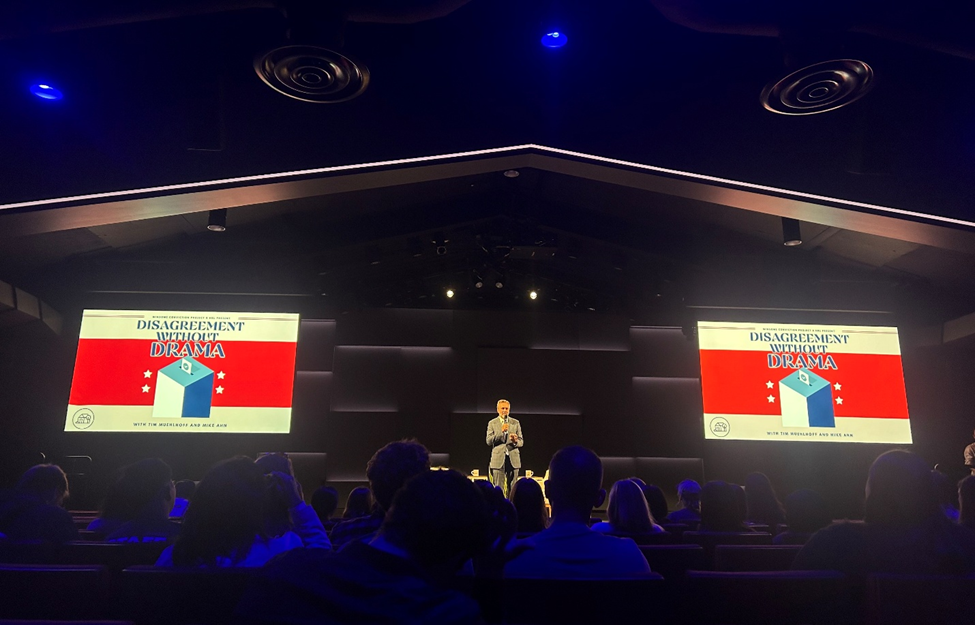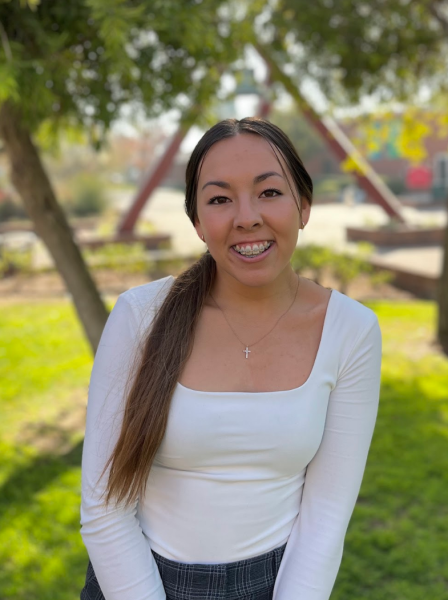The polls are in: the American people are torn. As Nov. 5 looms closer, tension and polarization grip the nation and its people, threatening to create an irreparable divide in our country.
How should Christians respond to the growing political divide? How do we communicate with people who hold different views? How can Christians have productive conversations to engage and disagree well?
Instead of ignoring or undermining the debates of our community, Biola University hosted Disagreement Without Drama to foster a culture of unity and respect – no matter the policy, no matter the party, no matter the president.
DISAGREEMENT WITHOUT DRAMA
On Oct. 23, Biola’s Housing and Residential Life (HRL) partnered with the Winsome Conviction Project (WCP) — a Biola-led initiative seeking to preserve human dignity despite disagreement — to produce an evening devoted to helping students engage with one another well in light of political division and disagreement.
In the face of a heated election season when respect can prove the last topic on anyone’s mind, the Ethel Lee Auditorium hosted a session open to all students where WCP leaders, communications professor Tim Muehlhoff, and dean of Spiritual Development (SD) Mike Ahn, discussed the polarization of the nation and how to prevent spreading of hateful disagreement within students.
The event was formatted as a discussion between Anh and Muehlhoff, beginning with an exhortation from President Barry Corey and concluding in a sweet combination of Q-and-A and Crumbl Cookies.
THE DRAMA
According to a Pew Research Center study in 2016, 33 percent of respondents said they no longer talk to a family member because of the presidential election. In 2020 they released a study revealing that the closer people follow political and election news, the more likely they are to say they have stopped talking to someone about it. 58 percent of American adults following political news have “very closely” stopped discussing politics with another person, and 48 percent responding “somewhat closely” have also decided to cut political conversation with someone. President Corey expressed the necessity of the Disagreement Without Drama event due to the prevailing societal tendency to listen to respond rather than listen to understand.
CONVICTIONS AND CONVERSATIONS
The HRL and WCP engaged a crowd of roughly 100 students through a lecture presenting the “three conversation model” consisting of pre-conversation, actual conversation, and post-conversation.
The first step — pre-conversation — includes the dialogue between a person and the Lord before the conversation with the person in disagreement even occurs.
“We have to deal with our heart before we deal with another person,” Muehlhoff stated. He highlighted the importance of asking God for humility, discernment, and empathy in the discussion to come.
The second step in the process is the actual conversation. Ahn described how to begin the conversation with the three questions about what the other person believes, why they believe it, and where they might agree.
Emphasizing the essential component of listening without preconceived notions, Ahn resolved the final step of the process based on the information provided by the other individual. He suggested finding one thing to say in response, whether a question or comment, with the intention of understanding rather than condescension.
Concluding the set of dialogues, the post-conversation challenges people to return to their group of like-minded friends with more of an open mind and greater empathy for the other side of the issue.
The speakers ended with a Q-and-A time, addressing questions sent in from audience members through an anonymous form.
At the end of the lecture, the speakers promoted an interactive website titled “End the Stalemate” which practices the “three conversation model” through the widely-debated issue of Christian support for former President Donald Trump. The evening also incited a contest amongst residence halls — whichever floor secures the most participation with the website — would receive a TV, game console, or other electronic prizes for their floor.
THE HEART BEHIND IT ALL
Coordinating the event was HRL Director Karly Mattocks, who disclosed her inspiration for the event that actualized her year-long vision. The idea for Disagreement Without Drama sprung from Mattocks’ personal struggle with the aftermath of the 2020 election, from difficult conversations with friends and family, challenging questions, and political implications and opinions of Christian communities.
Expressing her heart for Biola students, Mattocks hoped to help educate them about how to have healthy conversations without breaking relationships, whether with roommates, friends, or family. She desired to equip students to grapple with a hard question: how can someone be a Christian and vote for this person?
After overseeing the productive hour of dialogue, questions, and answers, Mattocks felt successful with the outcome of the event, hopeful that it helped students to take a step back from their own opinions in order to more intentionally engage and relate to one another. She shared that the content from Muehlhoff and Ahn provided practical insight even for herself to interact and empathize with those holding contrasting convictions.
Ahn hoped the event would redirect students’ focus “a little bit less about being right and a little bit more on how do we seek to understand one another,” echoing Mattock’s hope for Disagreement Without Drama.
BEYOND THE ELECTION
The goals for the event were to impact the lives of students beyond politics and Biola. Muehlhoff shared prior to the event the goal to “give people tools in the toolbox, not just for the upcoming election, but tools in communication they can use for the rest of their lives.”
Muehlhoff expressed the danger of confining oneself to a box and standing still in societal echo chambers, advocating that college is the perfect time to build communication skills that will leave a holistic impact. During another interview, Ahn advocated for a reimagining of these very boxes, teaching students to be proactive rather than reactive in conflict by helping them develop the communication skills needed to break a cycle of disagreement, anger and discontinuation of relationships. Recognizing how the majority of learning and formation happens outside of the classroom — from roommate dynamics to chapel to time with friends — Ahn revealed that “when we’re not able to express what we’re thinking or what we’re questioning, it’s not a helpful educational environment.” While Biola can present a united image as a Christian university in Los Angeles, people still hold contrasting convictions and students need to be able to engage in light of these differences, from political opinions to doctrinal debates.
Through the event, Ahn hoped to stir students to evaluate what they believe and why, seeking understanding even more than determining right or wrong. He also accentuated the stories of how people are shaped and treated participation and knowledge of these stories as a gift.
Beyond the event, the election, and Biola, Ahn urged students to “know your story and get to know your own viewpoint, but take the time to find someone who’s very different than you and hear where they’re coming from.”
A FIGHT FOR UNITY
What if the election could unite people rather than tear them apart? Disagreement Without Drama advocated for such a reality — that the 2024 election could prove constructive instead of destructive in the relational lives of Biola students, American citizens and followers of Jesus Christ. Mattocks, Muehlhoff, and Ahn worked to produce an event that would gift students with valuable communication tools to invest in their whole lives.
The charge from Disagreement Without Drama remains available to any willing listener through the End the Stalemate website and through daily decisions to “fight for unity,” as President Corey stated. If Christians, who share the bond of heaven in Jesus Christ their Lord, cannot disagree respectfully and continue in relationships, then how might we expect this of our nation and the world? Speaking the truth in love through honesty, unity, and curiosity holds the power to illuminate the Gospel -– that through honorable disagreement, the nation might know that Jesus Christ is Lord.






